
Commitment to Serving the Lord
We read John 13:1-17 the account of Jesus washing the disciple’s feet, in which Jesus makes a loud statement in a simple act of service. It is important to note that Jesus was secure in his authority (verse 3), he did not have any doubt as to who he was. This makes the first word of verse 4 so powerful; “So”, in light of his knowledge of his status he got up from the meal and began to serve his disciples. Often people don’t serve others because they feel that it will diminish their position and authority, they feel that it will somehow reduce their power or status. But Jesus did not need to be recognized, and he shows us that servanthood comes out of being secure in who you are. If you have ever felt that a particular act of service was below you, then you really don’t know who you are, as a Christian you already have a title that is far superior to any title given by man; you are a child of God.
Jesus continues to teach, and verses 16 and 17 are the key verses here. “Very truly I tell you, no servant is greater than his master, nor is a messenger greater than the one who sent him”. Jesus makes it clear, that he as the ultimate example of a leader was willing to serve in such a humble capacity, if we call ourselves his followers, then we better not think any act of service is below our title or position. Verse 17 contains the promise of the blessing; “Now that you know these things, you will be blessed if you do them.” Now that you have learnt this lesson, and if you do them, if you serve others sacrificially, you will be blessed. We will be blessed as we serve others.
Jesus in teaching his disciples frequently challenged the leadership paradigms of the day (see Matthew 20:26-28).
Jesus taught that genuine service ignores the usual arguments about greatness. There is no place for selfish motives and self-promotion when you are serving the Lord (see John 13:13-14).
A healthy church is one where everyone serves the Lord, serves each other and serves the lost. An unhealthy church, and unfortunately this is the typical Western church, is where 10% of the people do all the work of serving, and the rest treat the church as a convenience store where they come to once a week to get what they feel they need.
As we focus on becoming a healthy church this year, I want to challenge you to recommit to serving the Lord right here at Grace Point. We are the body of Christ and our calling is to be the salt and light to our community. Sharing the wonderful gospel message, giving freely of our time and resources in order to invite as many people as possible into the Kingdom of God. Would you re-commit to serving the Lord in 2017 here at Grace Point?
The truth is that you are not going to be always serving grateful or even deserving people, and when we are tempted to question whether or not the person or persons we are serving are deserving of our time and effort, we just need to be reminded of the fact that Jesus washed Judas’ feet. Jesus washed the feet of the one who had already made the decision to betray him, and Jesus knew it! We are not serving each other, we are serving the Lord.
Many of you already serve in so many capacities, and I don’t want you to sign up for more work and more activities, but I want to challenge you to think about your area of service, are you serving out of routine? Are you serving because you figure no-one else will do it? Maybe you are serving out of your own expectations, rather than serving the Lord.
As Christians, every act of service that we perform, points beyond itself and ultimately focuses attention on the cross of Jesus Christ.
There is joy and freedom in serving the LORD, his yolk is easy and his burden is light is what Jesus said in Matthew 11. When our service is to the Lord, it is life giving and it brings joy. If your service to the Lord is not bringing you joy, you need to stop and ask the Lord to realign your motivation and your passion. I know what I am talking about. I sometimes find that in ministry, I get tired and lose my zeal and enthusiasm, I lead between 9 and 11 ministry meetings each week. From prayer meetings to Sunday morning service, each one needs a different amount of preparation. I have found that every now and then, I need to stop, take some time with the Lord and remember why I am doing what I am doing, the tremendous privilege I have, the joy of serving the Lord and seeing lives transformed for the Kingdom of heaven. There is no greater privilege.
We live in a hurting world, all around us there is an abundance of pain and suffering, most the people you will encounter this week as you go about your daily life, do not have a personal relationship with Jesus Christ. Everyone of those people are destined to spend eternity in Hell. All around us the need is great. We have the Gospel message, we have the good news, and we also have a towel in our hands, something that the Lord has blessed us with to serve others. Serving your community in what may seem to be a small way, has unlimited potential to change the world for Christ. No act of service is too small.
When we develop a servant mindset in our community, it spills over beyond the four walls of this church and to the check-out counter at the grocery store, or the waiter at your favorite restaurant, or your neighbor who lost their dog. Every exchange with others is an opportunity for us to be a servant, and an opportunity for us to share the Gospel message. Let us be people who serve like Jesus did.

 As we study the Old Testament we see that it all points to the coming Messiah, it is as if the Old Testament is a road that leads to the little town of Bethlehem, and to a seemingly insignificant event on a global scale, a child being born who will be the savior of the world.
As we study the Old Testament we see that it all points to the coming Messiah, it is as if the Old Testament is a road that leads to the little town of Bethlehem, and to a seemingly insignificant event on a global scale, a child being born who will be the savior of the world.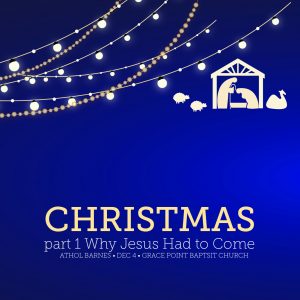

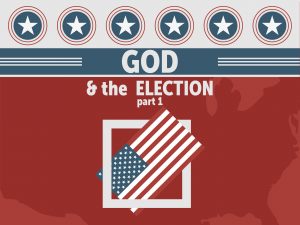
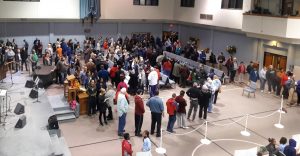
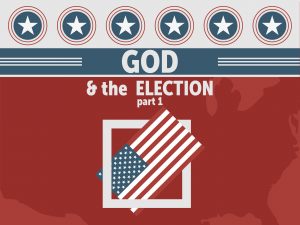
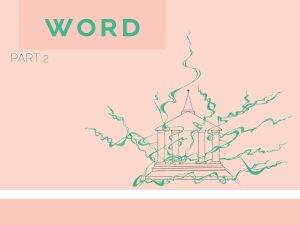

 Psalm 119 v9-16
Psalm 119 v9-16